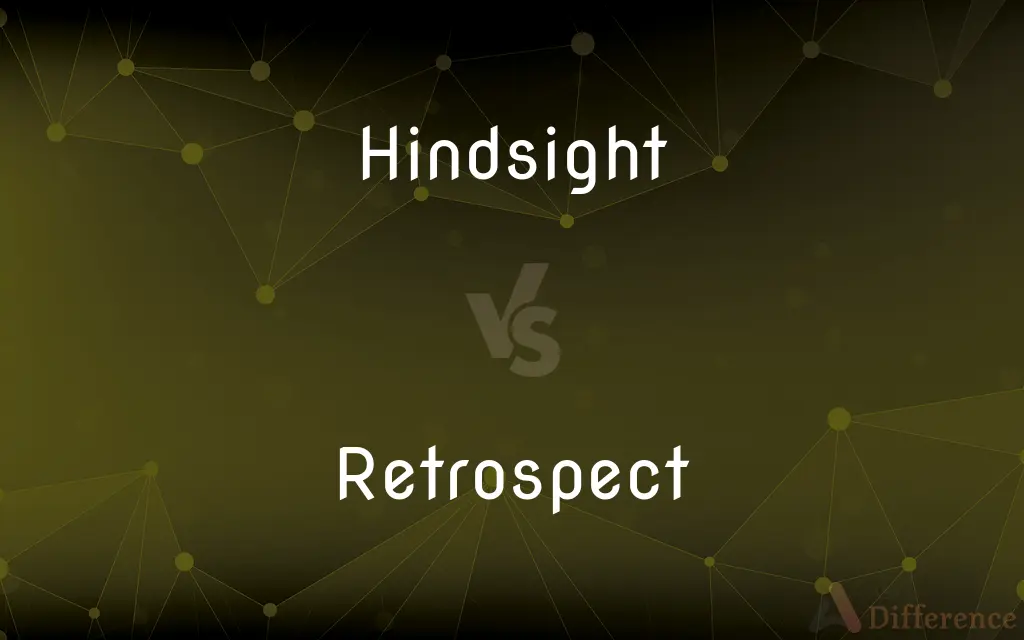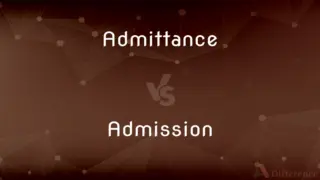Hindsight vs. Retrospect — What's the Difference?
By Urooj Arif & Fiza Rafique — Updated on April 16, 2024
Hindsight emphasizes understanding past events with new insights, while retrospect involves thoughtful reflection on past actions.

Difference Between Hindsight and Retrospect
Table of Contents
ADVERTISEMENT
Key Differences
Hindsight refers to the perception and understanding of past events only after they have occurred, focusing on the clarity that comes with time. In contrast, retrospect involves a deliberate act of reflecting on or reviewing past events, often with an intent to learn from them or to make sense of one's actions.
Hindsight is often associated with the recognition of mistakes or unforeseen outcomes, highlighting the "should have known" aspect. On the other hand, retrospect is typically used to contemplate or analyze events with the aim of gaining insights or closure, suggesting a more introspective approach.
The term "hindsight" is frequently used in the phrase "hindsight is 20/20," implying that it is easier to understand something after it has happened. Whereas, retrospect is commonly paired with the idea of retrospection, emphasizing a thorough or detailed examination of the past.
In everyday usage, hindsight has a somewhat passive connotation, as it describes an automatic recognition that comes with time passing. Conversely, retrospect carries a more active tone, indicating a deliberate decision to look back and ponder over past experiences.
Both hindsight and retrospect play crucial roles in learning and personal growth, but they differ in their typical applications and connotations. Hindsight is more about clarity and the inevitability of understanding past events, whereas retrospect focuses on the process of thoughtful examination and reflection.
ADVERTISEMENT
Comparison Chart
Definition
Understanding past events after they occur
Reflecting thoughtfully on past actions
Connotation
Often implies a realization of mistakes or unforeseen outcomes
Suggests a deliberate, introspective examination
Common Phrases
"Hindsight is 20/20"
"In retrospect"
Usage Tone
Passive; automatic recognition
Active; deliberate reflection
Purpose
Clarity and recognition
Insight and closure
Compare with Definitions
Hindsight
Understanding past situations with newfound clarity.
Hindsight provided the wisdom he lacked earlier.
Retrospect
Act of looking back on or reviewing past events.
In retrospect, he could see where he went wrong.
Hindsight
Recognition of events after they have occurred.
In hindsight, the signs were obvious.
Retrospect
Thoughtful consideration of past actions.
Retrospect helped her understand her journey.
Hindsight
Realization of previous mistakes.
Hindsight showed her the error in her decision.
Retrospect
Analyzing the past with a focus on improvement.
Retrospect provided him a chance to reflect on his actions.
Hindsight
Retrospective judgment or wisdom.
His hindsight was sharper than his foresight.
Retrospect
Contemplation of past decisions.
In retrospect, the decision was beneficial.
Hindsight
Late acknowledgment of facts.
Hindsight made them regret their hasty actions.
Retrospect
Reflection on experiences for learning.
She gained valuable insights in retrospect.
Hindsight
Perception of the significance and nature of events after they have occurred.
Retrospect
A review or contemplation of things in the past
"He pursed his lips in the exercise of a retrospect across the years" (Flann O'Brien).
Hindsight
The rear sight of a firearm.
Retrospect
To think about the past.
Hindsight
Realization or understanding of the significance and nature of events after they have occurred.
You know what they say, hindsight is twenty-twenty.
Retrospect
To look back on or think about (things past).
Hindsight
(rare) The rear sight of a firearm.
Retrospect
Consideration of past times.
Hindsight
Understanding the nature of an event after it has happened; as, hindsight is always clearer than foresight.
Retrospect
To look or refer back to; to reflect on.
Hindsight
Understanding the nature of an event after it has happened;
Hindsight is always better than foresight
Retrospect
To look backward; hence, to affect or concern what is past.
It may be useful to retrospect to an early period.
Retrospect
A looking back on things past; view or contemplation of the past.
We may introduce a song without retrospect to the old comedy.
Retrospect
Contemplation of things past;
In retrospect
Retrospect
Look back upon (a period of time, sequence of events, etc.); remember;
She reviewed her achievements with pride
Common Curiosities
What is the main difference between hindsight and retrospect?
Hindsight is understanding past events after they have occurred, whereas retrospect involves reflecting on past actions thoughtfully.
Can hindsight and retrospect be used interchangeably?
They are related but have different connotations; hindsight is more about clarity after the fact, while retrospect involves deliberate reflection.
Why is hindsight considered passive?
It is viewed as a natural result of events becoming clearer over time, rather than an active effort to reflect.
How does retrospect aid in personal growth?
It allows individuals to think critically about their past actions and learn from them.
Is retrospect always a positive practice?
It is generally positive as it is aimed at learning, though it can sometimes lead to regret.
Can too much hindsight be detrimental?
Excessive focus on past clarity might prevent moving forward and accepting change.
Is "hindsight is 20/20" a common phrase?
Yes, it suggests that it is easy to understand something clearly after it has happened.
What type of reflection is involved in retrospect?
Retrospect involves a deep, often critical reflection aimed at understanding or improvement.
Which is more likely to involve regret, hindsight or retrospect?
Both can involve regret, but retrospect is more about understanding and learning from the past.
How can one effectively use retrospect in personal development?
By critically analyzing past actions to identify strengths and weaknesses for future improvement.
How do hindsight and retrospect contribute to learning?
Both provide insights into past actions, though in different ways—hindsight through natural realization and retrospect through active reflection.
How does hindsight affect decision-making?
It can inform future decisions by providing a clearer understanding of past mistakes.
What does "in retrospect" imply?
It indicates a reflective look back at past events or decisions.
Can hindsight lead to changes in behavior?
Yes, recognizing past errors can motivate changes in future behavior.
Are there any professional fields where hindsight and retrospect are particularly valued?
Fields like history, psychology, and business analysis often value these concepts for evaluating past phenomena and improving future practices.
Share Your Discovery

Previous Comparison
Admittance vs. Admission
Next Comparison
Penne vs. RigatoniAuthor Spotlight
Written by
Urooj ArifUrooj is a skilled content writer at Ask Difference, known for her exceptional ability to simplify complex topics into engaging and informative content. With a passion for research and a flair for clear, concise writing, she consistently delivers articles that resonate with our diverse audience.
Co-written by
Fiza RafiqueFiza Rafique is a skilled content writer at AskDifference.com, where she meticulously refines and enhances written pieces. Drawing from her vast editorial expertise, Fiza ensures clarity, accuracy, and precision in every article. Passionate about language, she continually seeks to elevate the quality of content for readers worldwide.














































